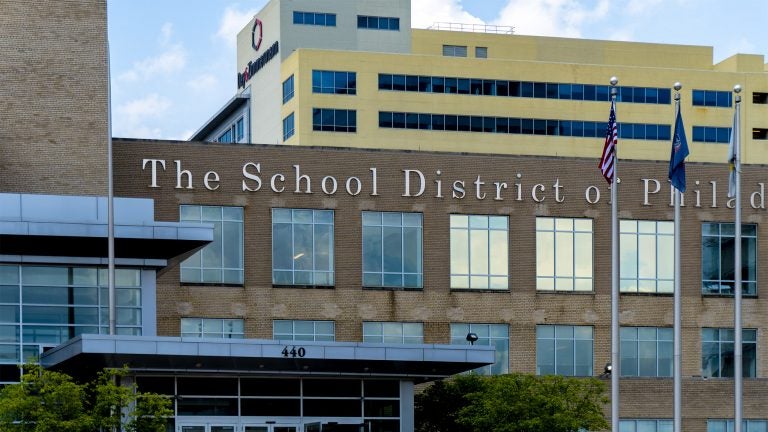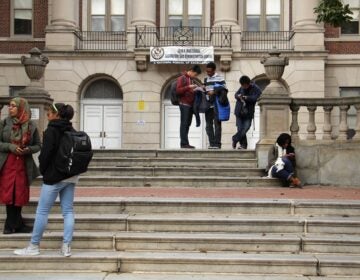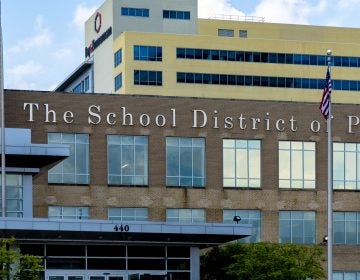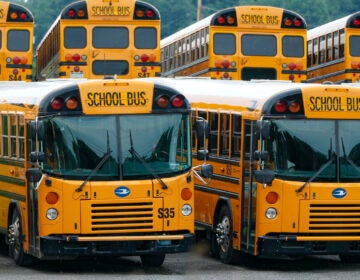Reversing course, Philly now plans to begin school year 100% online
After a flood of parent and staff outrage, Philadelphia public schools now plan to open the year 100% online. The plan is still subject to board approval.

Philadelphia School District headquarters. (Danya Henninger/Billy Penn)
Updated Wednesday, 2:13 p.m.
—
Are you on the front lines of the coronavirus? Help us report on the pandemic.
The School District of Philadelphia plans to open the school year fully online after staff and parents blasted an earlier attempt to offer some in-person learning.
The revised approach, released Tuesday afternoon, calls for all students to learn online until at least November 17.
The new plan still has to be approved by the district’s Board of Education, which reconvenes on Thursday afternoon after pausing its meeting last week.
“I believe it’s important to listen,” said Superintendent William Hite in a public letter. “And it’s important to have your trust and support as we all try to create a plan that will help our children learn in an environment we have never experienced.”
Hite said the district hopes it can start to hold some in-person classes after the first marking period ends.
Philadelphia joins Norristown and Allentown among large Pennsylvania school districts that say they will begin the 2020-21 school year fully online. Pittsburgh, the state’s second-largest district, has also hinted that it will be all-virtual in September.
Philadelphia, with more than 125,000 students, is easily the state’s largest district. Its decision to start the year online could ripple across the region, as school districts scramble to navigate the dire educational and health consequences of the coronavirus.
Two weeks ago, the district endorsed a “hybrid” model that called for most students to attend school in-person two days a week and online the other three days. The district also created a separate online school for students who did not feel comfortable entering a school building.
Officials felt this approach allowed them to do some face-to-face teaching, while also maintaining needed space inside school buildings. The city’s Department of Health endorsed the plan, with health and education leaders noting that an extended absence from in-person school could wreak educational havoc on the most disadvantaged students.
Fierce backlash from community members, however, prompted the district to change course.
Staffers and parents said they feared for their lives, citing rising COVID-19 case numbers, the district’s lack of resources and its poor track record on building maintenance.
The union representing the district’s principals and administrators opposed the plan shortly before it went to the Board of Education for an approval vote. On Tuesday, the Philadelphia Federation of Teachers — which represents educators, nurses, and other building staff — followed suit and said it, too, opposed in-person learning to begin the school year.
Though an earlier survey suggested most PFT members wanted to try a hybrid model, a more recent survey showed the majority were not comfortable returning to school buildings.
While trying to find its footing through a generational health crisis, district officials must also deal with the financial fallout caused by a flagging economy and plunging tax revenues.
The district received $13.7 million from the state’s health and safety grant program, but district leaders say the number should have been over $40 million if the state ran that money through its fair funding formula. Officials are also trying to rally public support for more federal stimulus money.
The district has enough money to make it through the upcoming school year, thanks in part to state leaders holding education funding flat instead of slashing it.
The future beyond that looks dicey.
Officials had hoped to bring all K-5 students back to school for face-to-face learning but concluded there wasn’t enough money to make it safe.
Though the all-virtual approach will allay some fears, it opens a host of new questions.
Among them: Will students have the necessary WiFi access? The school district has been pushing internet providers to open up new avenues for free, wireless internet. During the last school year, which ended online, officials estimated that about 5% of students did not have reliable internet access.
“City leaders are … working with numerous local internet companies to provide reliable internet access to all Philadelphia students who need it for the start of school and throughout the school year,” the district said in a letter announcing the switch to all-virtual.
There are also broad concerns about the effectiveness of online instruction. Even the state’s cyber charter schools, which have worked for years to refine their approaches to virtual education, have struggled to demonstrate sustained academic success.
Finally, there’s a widespread concern — expressed repeatedly by district officials — that virtual education will disproportionately harm students with the highest levels of need. Providing special education and English language instruction online has proven particularly difficult, officials and teachers say.
It is possible that public school buildings will still be open in some limited capacity, according to Hite.
The district may open up buildings as “drop-off centers” where students could receive some level of supervision as they complete online work. It’s also possible, Hite said, that teachers who want to conduct virtual lessons from their classrooms would be permitted to do so.
“We’re working on the details around that and how individuals may come in,” said Hite. “We’re already getting requests from some teachers who are saying, ‘Can I do this from my classroom?’”
The district’s new plan, if enacted, would represent an unprecedented disruption to public education in America’s poorest large city. For at least eight months, public school students will not receive normal classroom instruction — an absence bound to have societal ripple effects.
Philadelphia, however, is not alone in deciding that the risk caused by COVID-19 is too great to bear. Public schools in Los Angeles, San Diego, Houston, San Francisco, Nashville and Atlanta have also decided to begin the school year virtually.

Get daily updates from WHYY News!
WHYY is your source for fact-based, in-depth journalism and information. As a nonprofit organization, we rely on financial support from readers like you. Please give today.




![CoronavirusPandemic_1024x512[1]](https://whyy.org/wp-content/uploads/2020/03/CoronavirusPandemic_1024x5121-300x150.jpg)


